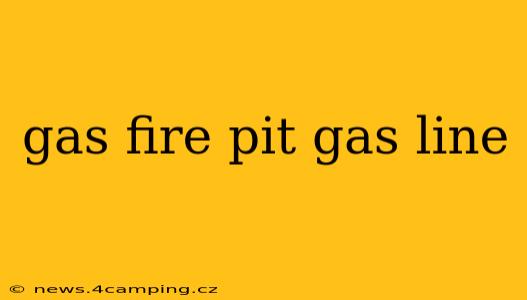Building a gas fire pit is a fantastic way to enhance your outdoor living space, creating a warm and inviting atmosphere for gatherings and relaxation. However, the safe and efficient installation of the gas line is crucial. This comprehensive guide will walk you through the process, addressing common questions and concerns to ensure your fire pit project is both successful and safe.
What Size Gas Line Do I Need for My Gas Fire Pit?
The size of the gas line you need depends entirely on the BTU (British Thermal Unit) output of your fire pit. Higher BTU outputs require larger diameter lines to safely handle the increased gas flow. Your fire pit's manual will specify the required input, and a qualified gas professional can determine the appropriate line size based on this information. Attempting to use a line too small can lead to restricted gas flow, inefficient burning, and potentially dangerous situations. Conversely, using a line that's too large is unnecessary and wasteful.
How Far Should the Gas Line Be From the Fire Pit?
The distance between the gas line and the fire pit is governed by safety regulations and best practices. The specific distance will vary depending on local codes and the type of gas line used. Generally, you want to allow sufficient space to prevent accidental damage to the line and to ensure proper ventilation. Always consult your local building codes and obtain necessary permits before beginning any installation. A qualified gas fitter will be familiar with these regulations and can guide you through the process.
Can I Install the Gas Line Myself?
While some individuals may be comfortable with DIY projects, installing a gas line for a fire pit is generally not recommended for homeowners without significant plumbing experience and knowledge of gas safety regulations. Improper installation can lead to gas leaks, fires, or explosions, posing serious risks to yourself and others. It's crucial to prioritize safety and hire a qualified, licensed gas professional to handle the installation. They will ensure the line is properly sized, installed according to code, and leak-tested for your safety and peace of mind.
What Type of Gas Line is Best for a Fire Pit?
Several types of gas lines can be used for fire pits, each with its own advantages and disadvantages. Common options include flexible corrugated stainless steel tubing, rigid black iron pipe, and copper tubing. The choice depends on factors such as the length of the run, the location, and local codes. A qualified gas installer will advise on the most appropriate material for your specific situation. They will also ensure that all connections are properly sealed and secured to prevent leaks.
How Much Does it Cost to Install a Gas Line for a Fire Pit?
The cost of installing a gas line for a fire pit varies significantly depending on several factors, including the length of the line, the complexity of the installation, and your geographical location. Material costs, labor charges, and any necessary permits all contribute to the overall expense. It's best to obtain multiple quotes from qualified gas professionals to compare prices and ensure you're getting a fair and competitive rate. Remember that prioritizing safety should outweigh cost concerns.
What are the Safety Precautions When Installing a Gas Line for a Fire Pit?
Safety is paramount when working with gas lines. Always turn off the gas supply before starting any work. Use appropriate safety equipment, including gloves and eye protection. Never attempt to repair or modify a gas line yourself unless you are a qualified professional. After installation, a thorough leak test is essential to ensure the system is operating safely. Regular inspection of the gas line and connections is also recommended to identify any potential problems early on.
This guide provides a foundational understanding of gas fire pit gas line installation. Remember, safety should always be the top priority. Consulting with a qualified and licensed gas professional is crucial for a safe and successful installation. They possess the expertise and knowledge to ensure your fire pit project is both enjoyable and hazard-free.
